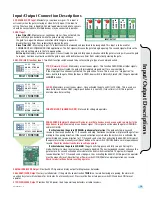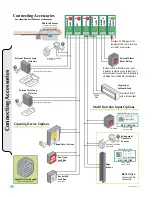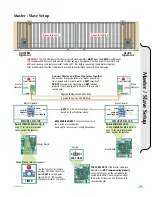
2
AVI Slide Rev - C
SAFETY
1.
Install the gate operator only when:
a)
The operator is appropriate for the construction of the gate and the usage class of the gate.
b)
All openings of a horizontal slide gate are guarded or screened from the bottom of the gate to a minimum of 6 feet (1.83 m) above the
ground to prevent a 2-1/4 inch (57.2 mm) diameter sphere from passing through the openings anywhere in the gate, and in that portion
of the adjacent fence that the gate covers in the open position.
c)
All exposed pinch points are eliminated or guarded, and
d)
Guarding is supplied for exposed rollers.
2.
The operator is intended for installation only on gates used for vehicles. Pedestrians must be supplied with a separate access opening. The
pedestrian access opening shall be designed to promote pedestrian usage. Locate the pedestrian gate such that persons will not come in
contact with the vehicular gate during the entire path of travel of the vehicular gate.
3.
The gate must be installed in a location so that enough clearance is supplied between the gate and adjacent structures when opening and
closing to reduce the risk of entrapment. Swinging gates shall not open into public access areas.
4.
The gate must be properly installed and work freely in both directions prior to the installation of the gate operator. Do not over-tighten the
operator clutch or pressure relief valve to compensate for a damaged gate.
5.
For gate operators utilizing Type D protection:
a)
The gate operator controls must be placed so that the user has full view of the gate area when the gate is not moving.
b)
The placard provided marked in letters at least 1/4 in. (6.4-mm) high with the word “WARNING” and the following statement or the
equivalent: “Moving Gate Has the Potential of Inflicting Injury or Death – Do Not Start Gate Unless Path is Clear” shall be placed adjacent
to the controls,
c)
An automatic closing device (such as a timer, loop sensor, or similar device) shall not be employed, and
d)
No other activation device shall be connected.
6.
Controls intended for user activation must be located at least six feet (6’) away from any moving part of the gate and where the user is
prevented from reaching over, under, around or through the gate to operate the controls. Outdoor or easily accessible controls shall have a
security feature to prevent unauthorized use.
7.
The Stop and /or Reset button must be located in the line-of-sight of the gate. Activation of the reset control shall not cause the operator to
start.
8.
A minimum of two (2) WARNING SIGNS shall be installed, one on each side of the gate where easily visible.
9.
For gate operators utilizing a non-contact sensor in accordance with Usage Class:
a)
See instructions on the placement of non-contact sensors for each type of application,
b)
Care shall be exercised to reduce the risk of nuisance tripping, such as when a vehicle trips the sensor while the gate is still moving,
and
c)
One or more non-contact sensors shall be located where the risk of entrapment or obstruction exists, such as the perimeter reachable
by a moving gate or barrier.
10.
For gate operators utilizing a contact sensor in accordance with Usage Class:
a)
One or more contact sensors shall be located where the risk of entrapment or obstruction exists, such as at the leading edge, trailing
edge, and post-mounted both inside and outside of a vehicular horizontal slide gate.
b)
One or more contact sensors shall be located at the bottom edge of a vehicular vertical lift gate.
c)
One or more contact sensors shall be located at the pinch point of a vehicular vertical pivot gate.
d)
A hardwired contact sensor shall be located and its wiring arranged so that the communication between the sensor and the gate
operator is not subjected to mechanical damage.
e)
A wireless contact sensor such as one that transmits radio frequency (RF) signals to the gate operator for entrapment protection
functions shall be located where the transmission of the signals are not obstructed or impeded by building structures, natural
landscaping or similar obstruction. A wireless contact sensor shall function under the intended end-use conditions.
f)
One or more contact sensors shall be located on the inside and outside leading edge of a swing gate.
Additionally, if the bottom edge of a swing gate is greater than 6 inches (152 mm) above the ground at any point in its arc of travel, one
or more contact sensors shall be located on the bottom edge.
g)
One or more contact sensors shall be located at the bottom edge of a vertical barrier (arm).
UL 325 Listings
UL 325 Listings
Summary of Contents for AVI
Page 2: ...2 AVI Slide Rev C ...
Page 23: ...21 AVI Slide Rev C NOTES ...





































